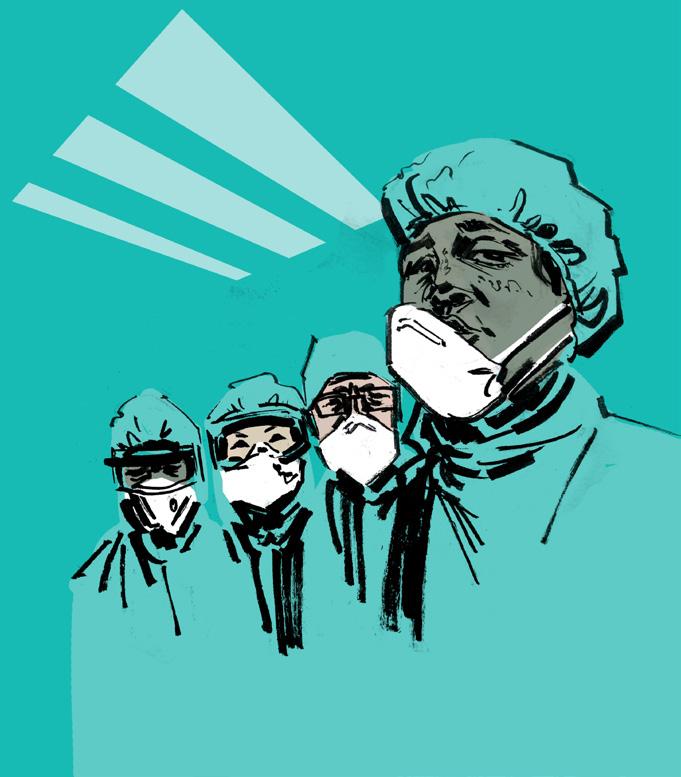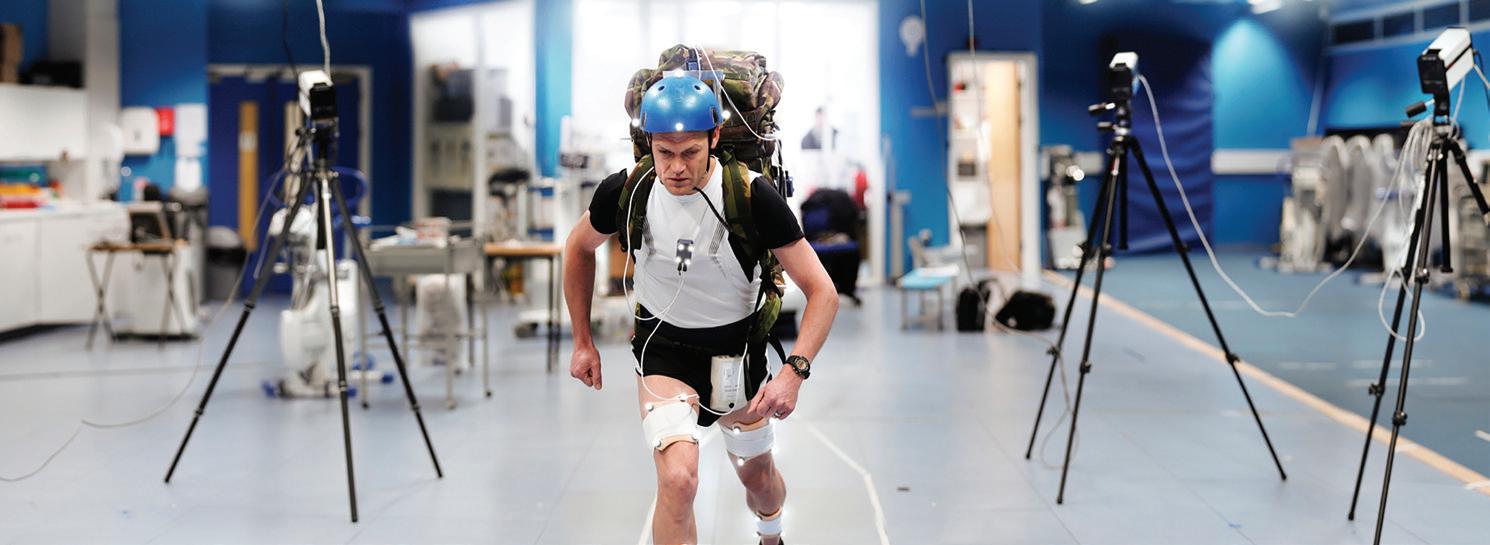
6 minute read
Research facilities
RESEARCH AT
THE UNIVERSITY OF SALFORD
Research at the University of Salford extends across schools, research centres and industry partners, in a truly unique way of collaborative learning. Our industry collaboration encourages a multi-disciplinary approach which contributes to our international reputation for world-class research.
Don’t just take our word for it. The Research Excellence Framework assesses the quality of research in UK academic institutions and we have some excellent results, including:
/ 50% of our research is world-leading or internationally excellent in terms of its originality, significance and rigour. / 90% of our research is of international quality. / 100% of our impact in social work and social policy is world-leading or internationally excellent. / 80% of our research outputs in electrical and electronic engineering, metallurgy and materials are world-leading or internationally excellent (REF exercise, 2014). You can see all our submissions and results at:
http://results.ref.ac.uk/Results/ByHei/168
RESEARCH PROJECTS
Our research spans areas as diverse as computer security, disaster management and homelessness. We excel in areas including materials physics, acoustics, built environment, computer science and informatics, diagnostic imaging, biomechanics, social work and social policy, business and management and arts and media.
Our recent research and developments include: / An environmentally-friendly aerosol valve which reduces emission of greenhouse gases / The use of cutting-edge technology to study and monitor wildlife in the Chernobyl exclusion zone / Construction processes that improve the resilience of communities to natural and man-made disasters / Establishing an evidence base to better understand and address the issues of energy consumption in buildings / Reduction of crime by clever urban planning / Advances in foot behaviour and biomechanics using 3D printing / Improved quality of life for arthritis sufferers with advances in health management / Unlocking the creative potential of 3D sound to provide immersive experiences to the general public at home or on the move / Prediction of radiation risk from medical imaging procedures using mathematical modelling and direct dose measurements / The role of business education in generating innovation amongst family businesses in
Manchester, Salford and Trafford
MITIGATING THE THREAT OF COVID-19 IN UGANDA The School of Science, Engineering and Environment has been awarded more than £500,000 to address the threat of Covid-19 in Uganda. The project is being funded by UK Research and Innovation through the UK Government’s Global Challenges Research Fund and the Newton Fund. The 18-month project is aimed at developing solutions to mitigate the impact of Covid-19 for some of the world’s most disadvantaged people.
Our Chair in Biomedicine, Professor Richard Birtles said ‘We will be sharing the knowledge and experience gained by Covid-19 laboratories in the UK over the past six months with Ugandan microbiologists to accelerate reliable testing in the country. This is important not only to help their national pandemic control efforts, but also to support exploration of the disease’s epidemiology.’
RESEARCH CENTRES
Research at the University is carried out within nine centres:
/ Centre for Social and Health Research (CSHR) / Centre for Urban Processes, Resilient
Infrastructures and Sustainable (Built)
Environments (UPRISE) / Salford Innovation Research Centre (SIRC) / Centre for Health Sciences Research (CHSR) / Salford Business School Research (SBSR) / Biomedical Research Centre (BRC) / Arts, Media and Communications Research
Centre (AMC) / Ecosystems and Environment Research Centre (EERC) Visit www.salford.ac.uk/research/researchcentres for information about each centre and their specialisms. POSTGRADUATE RESEARCH QUALIFICATIONS
Choose from a traditional PhD, a professional doctorate, PhD by published works, MPhil or MRes. You can study full-time, part-time, online or split-site (studying at the University and in another country). You may also have the opportunity to spend part of your research time studying abroad.
RESEARCH RESEARCH FACILITIES FACILITIES

THE BODMER LAB is a purpose-built lab with a bright, modern space containing a range of the latest high-spec equipment for environment and life science research students.
The newly opened TRANSLATIONAL MEDICINE LAB is dedicated to translational biomedical research and includes three cell culture facilities, a metabolic suite as well as a genome sequencer. The CENTRE FOR HEALTH SCIENCES RESEARCH has world-class research facilities including a human performance laboratory, two other biomechanics laboratories, a clinical imaging suite, a cognitive neuroscience lab; developmental psychology and social psychology labs and a rehabilitation flat. The SALFORD INSTITUTE FOR DEMENTIA epitomises our collaborative research ethos, bringing together a unique group of disciplines to research in the widest context the environment for people living with dementia and for their carers. This includes: the built environment; robotics, virtual reality, health and digital technologies; arts, music and design; health and social care professions; and social sciences. Two of our facilities are one of a kind: our ENERGY HOUSE is the only fully climate-controlled (inside and out) terraced house in the world, while our ACOUSTICS LABS house the largest number of acoustic facilities under one roof, including an anechoic chamber. We’re also the only University with a campus at MEDIACITYUK, with its industrystandard media facilities including TV, radio, chromakey and animation studies.
THINKLAB combines physical and virtual spaces to provide innovative collaborative workspaces. It has supported research on distributed virtual environments for aerospace, automotive, building construction and space mission planning. OCTAVE is our world-class, fully configurable, immersive holographic experience which engages sight, sound, and touch to bring together people and objects in one single virtual reality. Our NEW ADELPHI Building provides excellent facilities for students researching in the arts, including music, art and design and performance. This £55 million facility features a 350 capacity theatre, TV acting studios, industry standard recording studios, instrumental tuition rooms, a band-room/live room and a suite of flexible performance spaces.
It’s little wonder that these world-class facilities attract partners including Rolls Royce, Airbus, the BBC and ITV, Sun Microsystems and BAE Systems, amongst many others.
EXTERNAL RESEARCH FUNDING
The most important sources of funding for postgraduate research students in the UK are the research councils. These bodies are government-funded agencies engaged in the support of research in different disciplines. The research councils do not generally make studentship awards directly to students, but usually allocate them to departments in universities. For further information, follow the links below:
Arts and Humanities Research Council
www.ahrc.ac.uk
Biotechnology and Biological Sciences Research Council
www.bbsrc.ac.uk
Economic and Social Research Council
www.esrc.ac.uk
Engineering and Physical Sciences Research Council
www.epsrc.ac.uk
Medical Research Council
www.mrc.ac.uk
Natural Environment Research Council
www.nerc.ac.uk
Science and Technology Facilities Counci
www.stfc.ac.uk
FindaPhD
www.findaphd.com
Partial funding for postgraduate study is also available from certain trusts, charities and foundations. This includes studentships, scholarships, grants, bursaries, competitions and prizes.
INDUSTRY-SPONSORED RESEARCH
Industrial co-operative awards in science and technology (iCASE) provide funding for PhD studentships where businesses take the lead in arranging projects with an academic partner of their choice. Projects must be in the area of engineering and physical sciences.
www.salford.ac.uk/ktp/industrial-casestudentships
Knowledge Transfer Partnerships (KTPs) are a Europe-wide programme, part-funded by government, which form partnerships between universities and participating organisations. The recruiting organisation appoints suitably qualified postgraduate students to work on specific projects, while being jointly monitored by an academic supervisor.
www.salford.ac.uk/ktp
The Higher Education Innovation Fund Knowledge Exchange (HEIF) funds a broad range of research which results in economic and social benefit to the UK.
SUPERVISION, TRAINING AND DEVELOPMENT
Your supervision team - made up of a supervisor and co-supervisor with expertise in your topic area and methodology, along with a personal tutor for pastoral care - will guide and mentor you through your research programme. Supervision might also include a specialist from your field (e.g. a clinical staff member from the NHS).
As a postgraduate researcher at the University of Salford, you can take advantage of an extensive range of development activities. This includes Salford Postgraduate Research Training (SPoRT) which is designed to help you develop the skills you need for effective research, and transferable skills to enhance your employability. The Salford Postgraduate Annual Research Conference – SPARC – offers a space for postgraduate researchers from all disciplines to exchange ideas while developing confidence and presentation skills.
More details can be found at www.salford.









